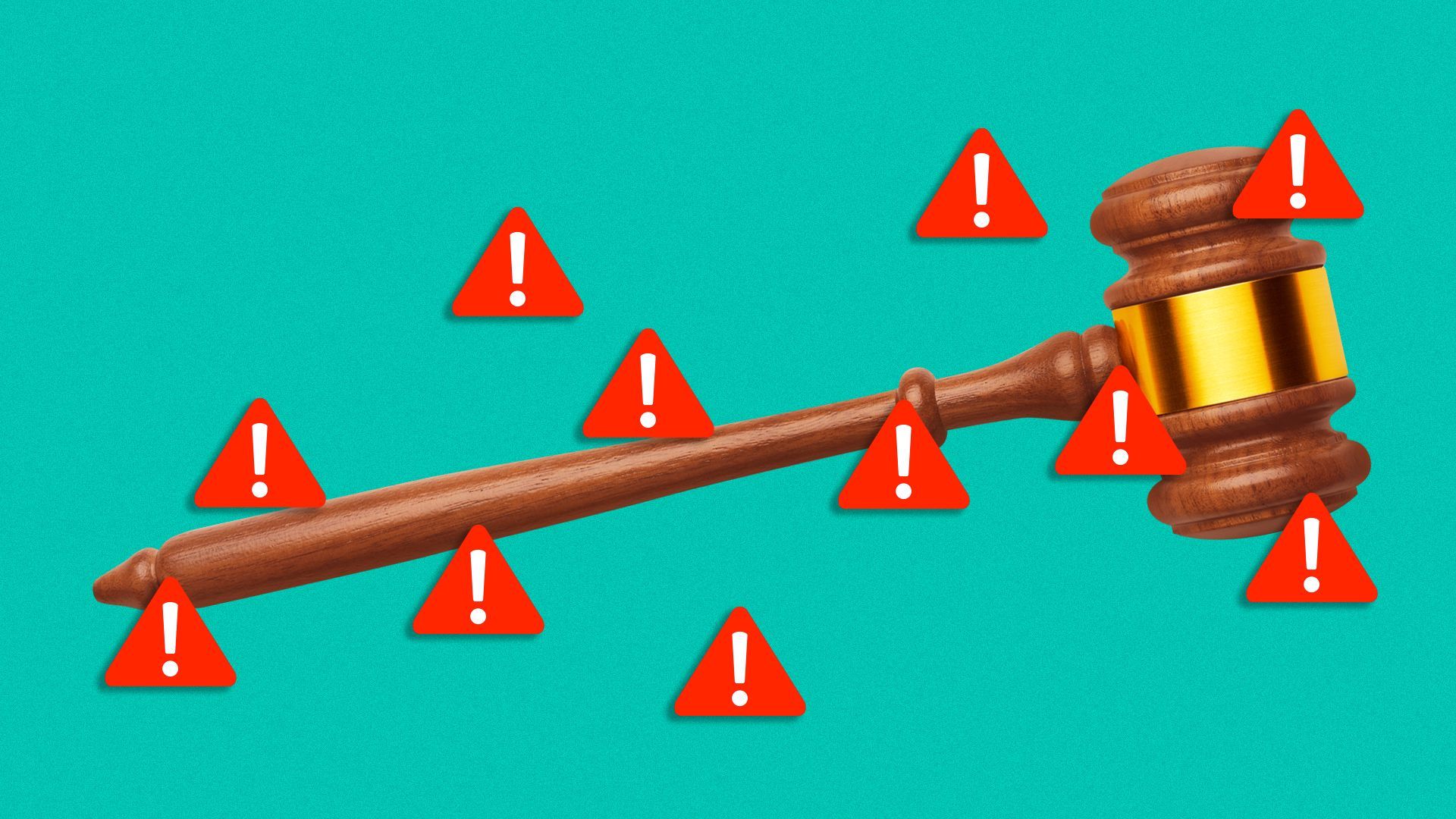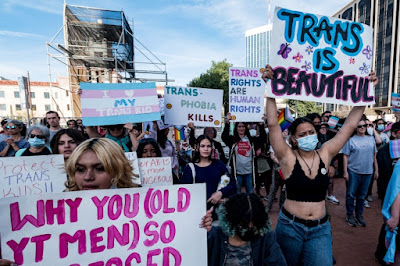
Illustration: Aïda Amer/Axios
Any day now, the Supreme Court is expected to rule in favor of rolling back affirmative action at universities, and the decision could have a domino effect on corporate diversity initiatives.
Why it matters: If overturned, corporate hiring and recruiting practices could be next to land in the crosshairs.
Catch up quick: The high court is weighing whether colleges can explicitly consider applicants' race in admissions.
- Those in favor believe affirmative action is critical for ensuring diversity, while opponents believe it discriminates against white and Asian students.
The big picture: Some conservative organizations have already begun to apply the discriminatory argument to U.S. companies.
- America First Legal has filed complaints with the Equal Employment Opportunity Commission and asked for an investigation into the hiring practices of such companies as BlackRock, Morgan Stanley, McDonald's, Starbucks, Twilio, Hershey and Kontoor Brands.
- "[Companies] should expect some litigation as an outcome based on what we think may happen," Valerie Capers Workman, chief legal officer for recruiting platform Handshake, told Axios. "That doesn't mean that the litigation will have merit, but it does mean that companies will probably have to spend some money defending claims that they otherwise would not have."
State of play: According to HR Dive, all Fortune 100 companies have publicly championed DEI commitments.
- HR, communications and in-house counsel Axios spoke with say they are monitoring the case closely and are preparing messaging based on the scope of the ruling.
- "One of the lessons from the Dobbs decision is that it's very hard in the immediate aftermath of a divisive decision to have a communication that doesn't appear to be taking one side or the other," a communications professional in the financial services industry told Axios.
- "No matter what the decision is, we're going to feel the same way about how important DEI is to us as a firm, so communicating that to internal stakeholders is the priority, and that can be done in advance of the decision."
Between the lines: Companies could see an uptick in reverse discrimination claims from employees if the Supreme Court rules against race-conscious admissions, Andrew Turnbull, a partner at Morrison Foerster, told Axios.
- "When people hear affirmative action has been overruled, they may say, 'Well, why is my company still doing diversity programs?'" Turnbull, who represents companies on labor and employment litigation, said.
🥊 Reality check: According to a Harvard study, U.S. states that eliminated affirmative action hiring requirements have seen a significant decrease in workplace diversity, compared to the states that kept affirmative action programs in place.
- Asian female, Black female and Hispanic male workers were most impacted by the statewide affirmative action bans, the report found.
What they're saying: Now is not the time to shy away from diversity initiatives, said Libi Rice, chief communications officer of the Executive Leadership Council, a nonprofit focused on advancing opportunities for Black executives.
- "This is an opportunity for companies to look at where they are right now, in terms of their recruiting of Black talent, where they're looking for Black talent, what they're doing to retain Black talent in their organizations, and to make sure that they continue to be authentic in their actions and continue to push forward, as opposed to letting a ruling like this shake them," said Rice.
- "Companies do not invest in DEI to favor a certain group of individuals over another group of individuals," said Aniela Unguresan, founder and CEO of Edge Certification. "Companies invest because diverse, equitable and inclusive workplaces are more agile, more resilient and are sustainably more successful than organizations [that] do less of those investments."
What we're watching: Much depends on the decision itself, its scope and the precedent it sets for lawsuits that could follow.
- There will be political ramifications following the decision, but it could also present an opportunity for chief diversity officers to expand their responsibilities and reframe the DEI function.
- "A lot of professionals are looking at changing the titles of diversity officer to chief workforce transformation officer— and in some ways, it's a positive outcome, because it could mean that the DEI role could be expanded," Capers Workman said. "It could be a larger, more encompassing role that encompasses not just diversity initiatives, but also the entire workforce culture."
- Plus, the ruling may spur some companies to actually bolster their DEI initiatives, Turnball said.
- "Not that they're looking to do anything unlawful, but I think you will see some companies double-down on their diversity initiatives and say, 'We believe in this, we don't care what the states are doing, we don't care what the Supreme Court is doing.'"
- What the End of Affirmative Action Means for BusinessBy the end of June, legal experts predict, the US Supreme Court will ban race-based admissions in higher education. It will be a concussive, though not fatal,blow to affirmative action’s corporate cousin: diversity, equity and inclusion.

The U.S. Supreme Court.Photographer: Andrew Harrer/Bloomberg
Kelsey Butler
June 22, 2023
The decision comes as companies are already caught in the crossfire of the culture wars, whether it’s a consumer boycott of a popular brand of beer or Republican-led states refusing to work with financial institutions that follow environmental, social and governance investing principles. With the court’s ruling, DEI could soon replace ESG as conservatives’ most-loathed acronym.
Bud Light was the target of a recent consumer boycott over a personalized can of beer given to a transgender influencer.
Photographer: Drew Angerer/Getty Images
The Supreme Court, which will actually rule on two cases—one centered on Harvard College and the other on the University of North Carolina—could scrap precedents dating back decades. A landmark 1978 decision in Regents of the University of California v. Bakke had barred the use of quotas yet allowed race to be considered as one of many factors in admissions. The court’s rationale wasn’t to correct racism’s legacy but to ensure a diversity of backgrounds and viewpoints in classrooms.
When demographers soon after predicted that entrants into the labor market would be mostly women and minorities by 2000, diversity became the goal—and mantra—that academia and corporations have cited to cope with a changing applicant pool and to justify admissions and hiring decisions.
At the same time, conservative resistance has grown. In the Harvard case, opponents argue that diversity provided cover for discriminating against Asian American applicants. DEI advocates predict companies will be next to face hostility. “Corporate America’s looking at that and saying, ‘first they came for academia, next they’ll come for us,’ ” says Janet Stovall, global head of DEI at the NeuroLeadership Institute, a leadership coaching firm.
For companies, the ripple effects of the ruling could be immediate, beginning with declines in minority student enrollment. After California’s 1996 Proposition 209 barred racial preferences—one of nine states with such bans—the number of Black freshmen at the University of California’s most selective campuses fell by half in the fall of 1998, when the ban took effect. In some cases, those numbers haven’t recovered.
As a result, fewer people from underrepresented groups will make their way into jobs and management roles. Almost 70 employers, including General Electric, Google and JetBlue Airways, warned in a brief to the court that without affirmative action they’ll lose access to “a pipeline of highly qualified future workers and business leaders” and will struggle to meet diversity hiring goals.
Looking simply at the letter of the law, the court’s decision won’t apply to employers. Private institutions such as Harvard are governed by Title VI of the Civil Rights Act, which outlaws discrimination in programs receiving federal funding. Private-sector workplaces, however, are governed by Title VII—a different, though similarly worded, section. Still, “many of the thought processes and the basic legal principles” are the same, says Daniel Pyne III, an employment specialist at law firm Hopkins & Carley. If the court strikes down race-conscious admissions in education, “that is a strong hint that the same decision might be made” in employment cases.
What else will this potential decision mean for the business world? Read more, including profiles of six people who say affirmative action helped their lives or needs to end.










